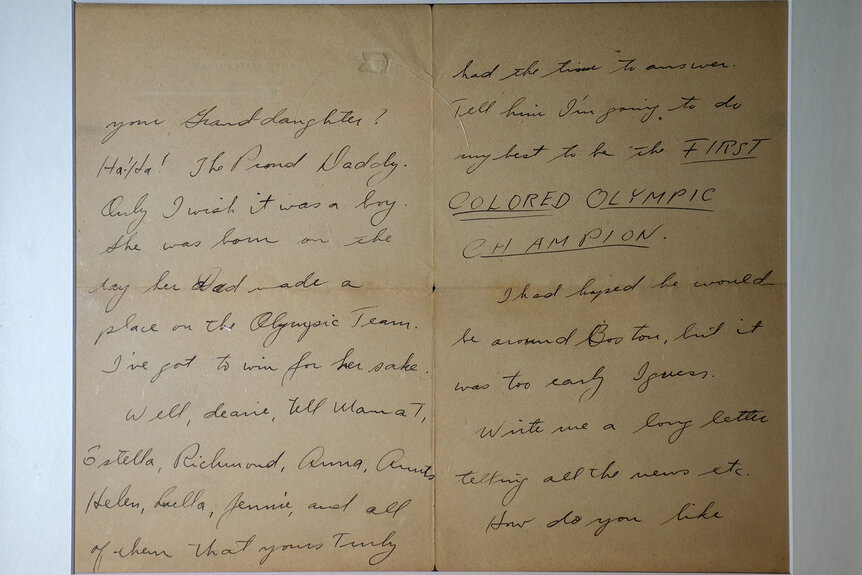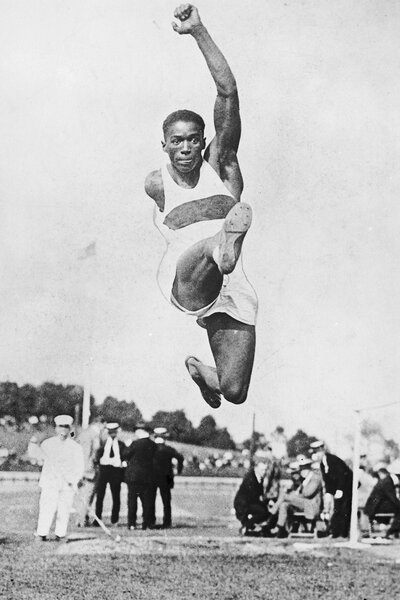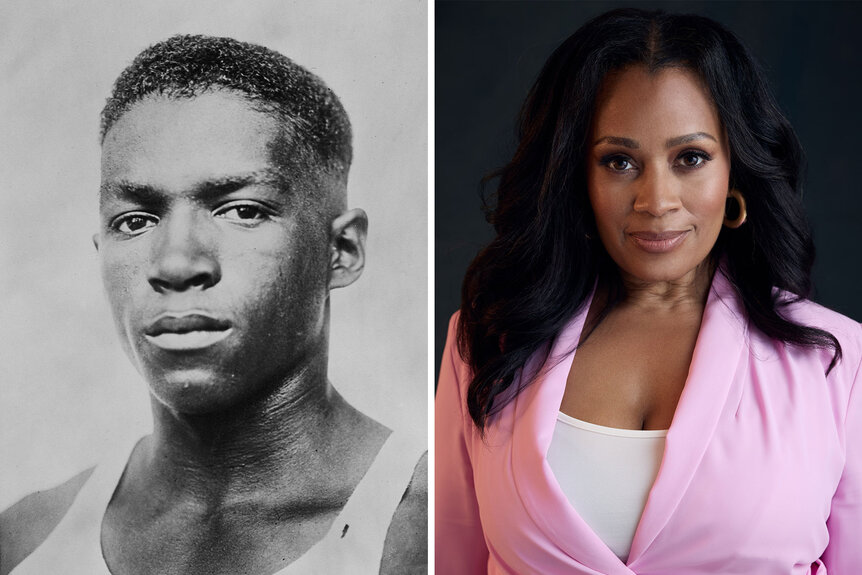The Irrational's Maahra Hill on Great Grandfather's Olympic Legacy: "So Proud"
"There's a certain limitlessness that he set as a standard, and we all have followed the course," she told NBC Insider about her great grandfather, who was the first Black man to win an Olympic gold medal in an individual sport.
The Irrational's Maahra Hill is watching the Summer Olympics with a heightened sense of appreciation and respect for the athletes, all because of an amazing family connection.
The actress recently spoke to NBC Insider about her great grandfather, the late track and field star William DeHart Hubbard, who was the first Black athlete to win a gold medal in an individual event, in his case long jump, according to Olympics.com. This groundbreaking moment took place 100 years ago, when the Olympic Games took place in Paris for the second time in 1924.
Not that you'd hear DeHart Hubbard brag about it, though. Hill said he's been described by her mother, DeHart Hubbard's granddaughter, as a "modest" man who prioritized his family.
"He was coming over and, you know, bring them donuts at six o'clock in the morning, making waffles and pancakes, and making sure that they were on top of their schoolwork so that they go to college," Hill explained. "His interests were more about making sure that they succeeded than what he had accomplished."
RELATED: The History of the Olympic Games, From Ancient Greece to the Modern Era
Now, Hill is hoping to bring more recognition to her great grandfather and how he paved the way for other athletes of color. "We've always been so proud," she remarked.
About William DeHart Hubbard
Born in 1903, DeHart Hubbard grew up in Walnut Hills neighborhood of Cincinnati as one of eight children, according to the Walnut Hills Historical Society. He showed real promise in sports throughout high school and was offered a scholarship to attend Harvard University, an offer he turned down "because he wanted to earn his way," Hill said.
Ultimately, DeHart Hubbard participated in a newspaper competition in which the winner would receive a college scholarship, per the Walnut Hills Historical Society. He won outright and chose to attend the University of Michigan, where he was one of the few Black athletes. "I was the only Black on the Michigan track team those four years, and rarely competed against others, even in national meets. In the Big Ten, Iowa and Michigan State had a few in either football or track. Only four of us made the 1924 Olympic team," DeHart Hubbard later told author John Behee.
DeHart Hubbard traveled to Paris on a packed boat and vowed to make his family proud. "Tell Papa I got his letter, but have been busy traveling etc., and have not had the time to answer. Tell him I’m going to do my best to be the FIRST COLORED OLYMPIC CHAMPION," he wrote in the letter, seen above.
When DeHart Hubbard arrived in Paris, he was told he couldn't compete in all the events he qualified for – the 100-meter dash and the high hurdle, in addition to the long jump – because of the color of his skin, his nephew Kenneth Blackwell, the former secretary of state of Ohio, recently told NBC News. To make matters worse, Hubbard learned that a new record had been set in the long jump by Bob LeGendre.
"He ended up having a sleepless night about the fact that he wasn't going to secure the gold and the world record at the same time," Hill recounted.
But this news seemingly gave DeHart Hubbard a renewed sense of purpose, as he would win the gold medal and later set a new record in 1925 when he returned to Michigan. At the 1925 NCAA Championships, he beat LeGendre's record by five inches and also tied the world record in the 100-yard dash, according to USA Track and Field.
DeHart Hubbard continued to pave the way for other Black athletes, working as a race relations adviser for the Federal Housing Authority and founding the Cincinnati Tigers baseball team, which was a part of the Negro American League, per his USATF bio. And his love for sports never once faded, with Hill sharing, "Even in the '50s, he was still bowling."
RELATED: Here Are All the U.S. Medal Winners at the 2024 Paris Olympics
DeHart Hubbard died at the age of 72 in 1976.
His descendants have since forged their own paths, with Hill becoming an actress, and his nephew Ken Blackwell previously serving as a mayor of Cincinnati.
Hill credits DeHart Hubbard for raising his kids and grandkids to have an "unshakable belief" in themselves and what they're capable of. "I'm grateful for having that point of view. There's a certain limitlessness that he set as a standard, and we all have followed the course," she reflected.
Hubbard's Legacy, 100 Years Later
Now, a century later, Hill is in awe of the changes that have taken place since her great grandfather made history in Paris and proud of the athletes who follow in his footsteps.
"Knowing what it took for him to get there, it kind of makes me wonder about each athlete and what it requires of them," she told NBC Insider.
Hill also feels a greater sense of empathy for athletes like Simone Biles, who endured injuries in the run-up to the Olympics, having heard about the impact it had on DeHart Hubbard's confidence. "So when I see some of the athletes injure themselves, I know how debilitating that is psychologically. It's a different point of view, just looking at it through his eyes a bit," she explained.
So Team USA's gymnasts can count on Hill cheering them on from her couch. And, of course, she'll also be watching the track and field team, saying, "That'll be where most of my attention goes."
Then, come fall, fans can watch Maahra Hill when The Irrational returns for a second season.
Hill couldn't spill too many details about what's to come, but she promised, "We've got a really exciting season ahead."






































